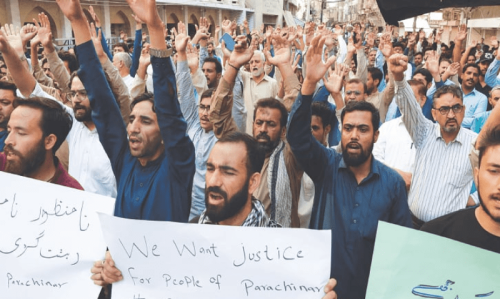ISLAMABAD: Niaz Ali visited the I-11 slum on Monday, where he lived before it was bulldozed by the Capital Development Authority (CDA). The 30-year-old said nothing remains of the house he had once resided in as development has already been started in the sector.
“My life has become worse in the two years [since the slum was razed down] and my whole family has been suffering. I had my own house, and even if it was made of mud, I did not have to worry about rent. I used to drive a rented rickshaw and life was going on smoothly,” Mr Ali told Dawn on the second anniversary of the CDA’s campaign against the slum.
He said he has since moved into a rented house in Fauji Colony Rawalpindi.
“It was difficult for me to pay rent for the house and the rickshaw so I handed the vehicle over to the owner and started working as a loader in the fruit and vegetable market,” he said.
He went on to say that a few months after the slum was razed down, his wife’s CNIC expired and when he went to have it renewed, officials at the National Database and Registration Authority (Nadra) told him her CNIC has been blocked due to suspicions that she was Afghan.
“They told me to give documents proving they really belonged to the Mohmand Agency,” he said.
The father of four said he now only earns a few hundred rupees a day and has a feeling that things might never be as they were two years ago.
“I appeal to the decision makers that they should not demolish other slums and to provide the former residents of the I-11 slum with housing,” he said,
Other former residents of the slum also visited their demolished homes on Monday.
The Awami Workers Party (AWP) had organised a rally on the second anniversary of the demolition of the I-11 slum. Participants of the rally, including former residents of the slum, marched around the fruit and vegetable market before they headed for the slum, which had remained a no-go area for many months after the operation.
The CDA has now removed the barbed wire and levelled the lands so that plots can be handed over to their owners, who have been waiting to be handed possession for decades.
AWP Punjab President Asim Sajjad told Dawn the party had decided to gather former residents of the slum on the second anniversary of its demolition to remind decision makers that the issue was still pending.
“We filed a petition in the Supreme Court but the case has not been decided. We also demanded that the CDA should not demolish any slum as long as the court has not decided the case. Compensation should be paid to former residents of the slum because they have been suffering,” he said.
Four years ago, a slum dweller Amin Khan filed a petition in the Islamabad High Court (IHC) that in the year 2000 he had applied for a CNIC but was refused by Nadra because he was not a resident of Islamabad. He was refused a CNIC again in 2013.
IHC Justice Shaukat Aziz Siddiqui was surprised to learn that unregistered citizens were living in the federal capital so he demanded a record from the CDA and asked about the number of people living in the capital without residential proof and ordered to have them removed. The CDA informed the court that they had earmarked 42 katchi abadis to be demolished across the city. The I-11 katchi abadi was demolished by the CDA on July 31, 2015 and its citizens evicted.
Mr Sajjad said over 15,000 people lived in the slum, the majority of whom worked in the fruit and vegetable market.
However, according to a CDA survey, there were 7,995 people in the I-11 slum.
Published in Dawn, August 1st, 2017













































